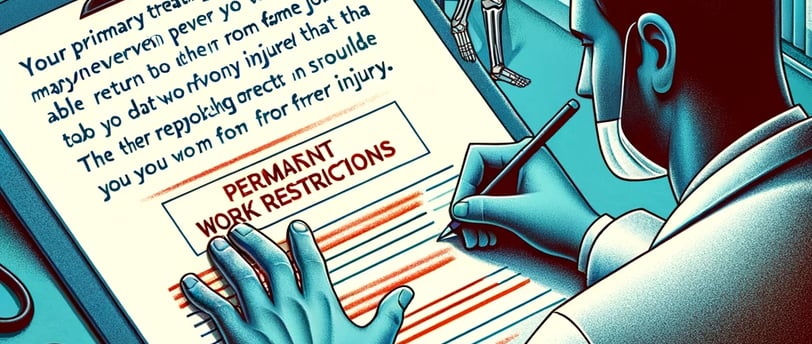Can a Doctor Say You Can't Work?
WORKERS COMP DOCTORWORK INJURYWORKERS COMPENSATION LAW
2/23/20242 min read


When it comes to determining your ability to work, your primary treating physician plays a crucial role. In certain situations, your doctor may conclude that you are unable to return to the same job or working conditions as before your injury. This determination is typically made based on a thorough evaluation of your medical condition and its impact on your ability to perform your job duties safely and effectively.
If your doctor believes that you are incapable of returning to your previous job, they should provide a written report outlining their findings. This report serves as an official document that substantiates your doctor's opinion and can be used as evidence in various legal and administrative processes.
When preparing the report, your doctor will typically include details about your medical condition, the extent of your injuries, and any relevant medical tests or examinations that were conducted. They will also outline the specific reasons why they believe you cannot resume your previous job or work under the same conditions.
Furthermore, the report should include permanent work restrictions that aim to protect you from further injury. These restrictions are designed to ensure that you are not exposed to activities or tasks that could exacerbate your condition or jeopardize your overall well-being. By outlining these restrictions, your doctor is emphasizing the importance of prioritizing your health and safety in the workplace.
It's important to note that the determination made by your primary treating physician is not solely based on their personal opinion or subjective judgment. Instead, it is rooted in their professional expertise and knowledge of your specific medical condition. They will consider various factors, such as the nature of your injury, the expected recovery timeline, and any potential long-term implications.
While your doctor's opinion carries significant weight, it is also subject to review and evaluation by other parties involved in the process. Insurance companies, employers, and legal representatives may request additional medical examinations or seek second opinions to ensure that the decision is fair and accurate.
If your doctor concludes that you are unable to work, it is important to follow their guidance and adhere to the recommended work restrictions. Ignoring these restrictions could potentially worsen your condition or lead to further complications.
Ultimately, the determination made by your primary treating physician regarding your ability to work is a critical factor in your overall recovery and well-being. It is essential to maintain open communication with your doctor, provide them with accurate and detailed information about your symptoms and limitations, and actively participate in any additional evaluations or examinations that may be required.
Get in touch


THIS IS AN ADVERTISEMENT: We are not a lawyer referral service or a law firm and do not provide legal advice. This is a free matching service only, claim reviews will be performed by a third-party attorney. We do not recommend or endorse any attorneys who pay to participate in this advertisement. An attorney-client relationship is not formed when you submit the form and you are under no obligation to retain a lawyer who contacts you through this service. Services are only available in Texas.
